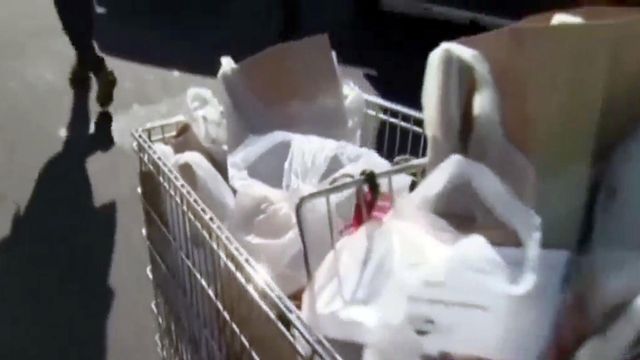Plastic bags could soon return to OBX stores
Businesses on the Outer Banks could soon be allowed to use plastic bags again under a measure that passed the state Senate Monday night.
Posted — UpdatedThe Senate's Rules Committee voted on party lines Monday afternoon to send the measure to the Senate floor Monday night, where it passed mostly on party lines, 31-17, in time to meet crossover requirements.
The ban was instituted under the leadership of former Senate President Pro Tem Marc Basnight, a Dare County Democrat, as a way to cut down on litter and sea turtle deaths. Plastic bags look like jellyfish when they're in the water, and sea turtles eat them and then die. The state's coast is prime nesting habitat for many sea turtle species.
But Sen. Bill Cook, R-Beaufort, said tourists are still bringing plenty of plastic bags onto the beach that they've brought with them from inland. He called the law "a feel-good thing from the beginning."
"The ban is not working. It doesn’t do what it was intended to be done, and it’s an infringement on the freedoms of people in that area," Cook told the committee. "What I’m trying to do here is provide some freedom to the Outer Banks so that they can do whatever they want to do."
The 2009 ban required stores to offer paper bags, which are more expensive, and also required stores to offer a refund or credit to shoppers who bring their own bags.
Sen. Jerry Tillman, R-Randolph, said he talked to one retailer who estimated the ban was costing his business $50,000 a year.
"Do you realize, folks, that if you take a plastic bag down there, the merchant's got to pay you for that cost?" Tillman asked the committee. "There's a lot of anti-business wrapped up in that ban."
Tillman conceded the ban did help cut down on litter initially but said it's no longer needed.
"They don't have this ban in Myrtle Beach, and they don't have plastic bags down in Myrtle Beach," he said.
During the public comment session on the measure, a business owner from Kill Devil Hills took issue with statements by Tillman and others that the business community wants the ban repealed.
"No one is for this on the beach, I'm here to tell you. No one wants this," said John Wasniewski, noting that city councils on the Outer Banks and the Dare County Board of Commissioners have taken action to support the ban.
A survey by the Outer Banks Chamber of Commerce found widespread support in the business community as well.
"These bags kill turtles. I could talk about that, but I don't think you care about turtles," Wasniewski told the panel. "You should give us the freedom to decide what we want. This is what we want."
In an unusual breach of decorum, Tillman challenged Wasniewski directly: "You made a mistake. How many of these merchants have you talked to?"
"The environment is so bad down there for grocery stores that two new ones are opening up," Wasniewski shot back.
Nonetheless, North Carolina Retail Merchants Association lobbyist Elizabeth Robinson said her group had heard from some members on the coast that they would support a repeal, calling the ban "costly" and "ineffective."
Senate Bill 434 also includes provisions that would roll back many local requirements for runoff buffers to protect rivers, with sponsor Rep. Andy Wells, R-Catawba, saying buffer requirements should be uniform statewide.
Wells called the buffer requirements "veneer environmentalism – a thin layer that looks good to folks but doesn't accomplish anything."
"The buffers don't address water quality issues," Wells told the committee.
Catawba Riverkeeper Sam Perkins said that's absolutely not the case, arguing that buffer protections for the Catawba River are "a critical foundation" for water quality since the river supplies drinking water to 2 million people in Charlotte.
"There's plenty of scientific study supporting why buffers are good," Perkins said.
The measure now goes to the House.
Related Topics
• Credits
Copyright 2024 by Capitol Broadcasting Company. All rights reserved. This material may not be published, broadcast, rewritten or redistributed.





